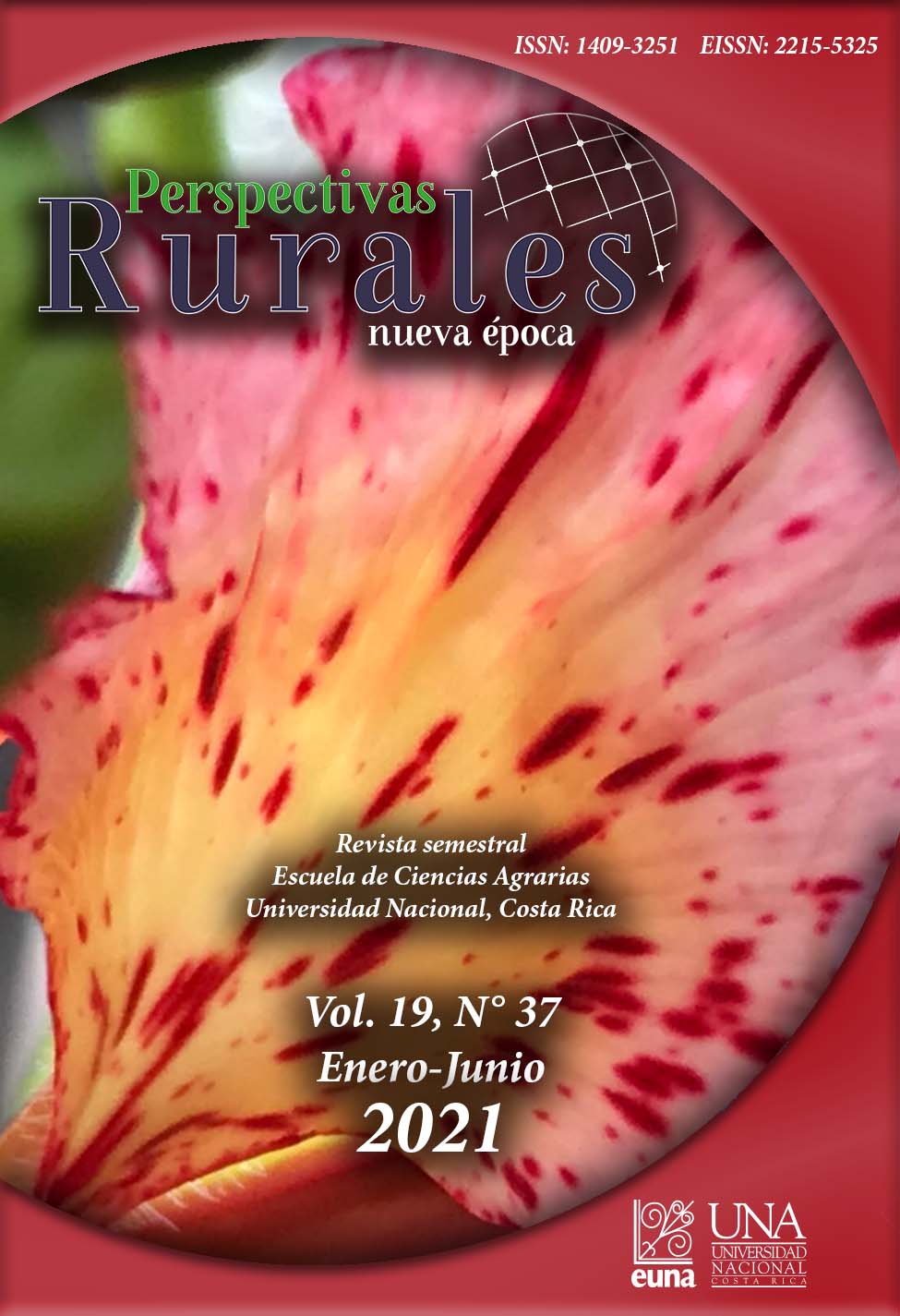Repeasantization of the future. The peasant as an alternative to the collapse of the global agri-food system
DOI:
https://doi.org/10.15359/prne.19-37.1Keywords:
Peasant, Agri-food system, Repeasantization, Deagrarianization, Depeasantization, COVID-19Abstract
Deagrarianization and depeasantization have been the dominant trends in the agrarian history of neoliberal capitalism. These phenomena have been inherent to the installation of a global agri-food system, supported by agribusiness and corporate agribusiness. This system has shown numerous vulnerabilities, which were made evident during the international economic and food crisis unleashed in 2007. The COVID-19 pandemic has once again exposed the vulnerabilities of the corporate agri-food system, while it has narrowed its capacities to guarantee food security. Since its foundation, the international peasant movement grouped under Vía Campesina has opposed to the commodification of food and has struggled to place the farmer at the center of the discussion on food systems. The movement has proposed that the right to food can only be ensured by farmers, who, in turn, will be guarantors of Food Sovereignty. For this, advancing repeasantization is imperative, both quantitatively and qualitatively. Based on recent bibliography on the matter, this article presents the peasant option for repeasantization as an alternative to corporate and neoliberal control of food production and distribution and, more broadly, as a horizon for the construction of a future post-pandemic world.
References
ALTIERI, Miguel y Clara Nicholls, 2020, “Agroecology and the Reconstruction of a Post-COVID-19 Agriculture.” Journal of Peasant Studies 47 (5), 881–898.
Altieri, M. y Nicholls, C. (2020), “Agroecology and the Reconstruction of a Post-COVID-19 Agriculture.” Journal of Peasant Studies 47 (5), 881–898.
Araghi, F. (2020). “Auge y decadencia del estado de bienestar agrario: campesinos, globalización y privatización del desarrollo”, Julio Boltvinik & Susan Mann (editores), Pobreza y persistencia campesina en el siglo XXI: teoría, debates, realidades y políticas, México, Siglo XXI, pp. 313-38.
Bartra, A. (2020). “Repensar lo rústico. Aportes a una teoría del campesinado contemporáneo”, Julio Boltvinik & Susan Mann (editores), Pobreza y persistencia campesina en el siglo XXI: teoría, debates, realidades y políticas, México, Siglo XXI, pp. 113-33.
Bartra, R. (1974). Estructuras agrarias y clases sociales en México, México, ERA.
Bernstein, H. (2011), “A dinâmica de classe do desenvolvimento agrário na era da globalização”. Sociologias, 13( 27), mayo-agosto.
Bernstein, H. (2012). Dinámicas de clase y transformación agraria. México, Miguel Ángel de Purrúa, Universidad Autónoma de Zacatecas.
Blay-Palmer, A., Carey, R., Valette, E. and Sanderson , M. (2020). “Post COVID 19 and Food Pathways to Sustainable Transformation.” Agriculture and Human Values 37. 517–519.
Borras, S. M. Jr., Hall, R. Scoones, I. White B. & Wolford, W. (2011), “Towards a Better Understanding of Global Land Grabbing: an Editorial Introduction”, The Journal of Peasant Studies 38 (1), pp. 209-216.
Bryceson, D. (1996). “Deagrarianization and rural employment in sub-Saharan Africa: A sectoral perspective”. World Development, 24(1).
Bryceson, D. (2000). “Disappearing Peasantries? Rural Labour Redundancy in the Neo-Liberal Era and Beyond” Deborah Bryceson, Cristóbal Kay y Jos Mooij, Disappearing Peasantries?, London, Intermediate Technology Publications.
Burawoy, M. (2020). “Historia de dos marxismos. En recuerdo de Erik Olin Wright (1947-2019) Olin Wright”. New Left Review, n°121, pp. 77-111.
Calvário, R. (2017). “Food sovereignty and new peasantries: on re-peasantization and counter-hegemonic contestations in the Basque territory”, Journal of Peasant Studies. 44 (2), 402-420.
Clapp, J. & Moseley, W. G. (2020). “This food crisis is different: COVID-19 and the fragility of the neoliberal food security order”, Journal of Peasant Studies, 47 (7), 1393-1417.
Contreras, R. (2014). Volver a la tierra. La recampesinización forzada de migrantes internacionales de retorno al Valle del Mezquital, Hidalgo, México, Tesis de maestría en Antropología, Facultad de Filosofía y Letras UNAM.
Contreras, R. (2015). “Antropología y campesinado: la pertinencia de lo persistente. Reflexiones antropológicas en torno al internacionalismo campesino”, Revista Cultura-Hombre-Sociedad, CUHSO. 25 (2). pp. 9-43.
Contreras, R. (2021). “Con los pies en la tierra: Por una recampesinización de la utopía”, João Louçã y Paula Godinho (org.) Quando a história acelera: resistências e movimentos sociais, Lisboa: Universidade Nova de Lisboa, pp. 72-89.
Desmarais, A. (2008). La Vía Campesina: La globalización y el poder del campesinado. Barcelona, Editorial Popular.
Dinerstein, A. y Harris, F. (2021),.A World Beyond Work?: Labour, Money and the Capitalist State Between Crisis and Utopia, UK, Society Now- Emerald Publishing Limited.
Edelman, M. (2016). Estudios agrarios críticos: Tierras, semillas, soberanía alimentaria y los derechos de las y los campesinos, Quito, Instituto de Altos Estudios Nacionales (IAEN).
Escalante, R., Catalán, H., Galindo, L., Reyes, O., (2007). “Desagrarización en México: tendencias actuales y retos hacia el futuro”. Cuadernos de Desarrollo Rural, núm. 59, julio-diciembre, 2007, pp. 87-116. Pontificia Universidad Javeriana, Colombia.
Evans B. & Reid, J. (2016). Una vida en resiliencia. El arte de vivir en peligro,.México : FCE.
FAO, FIDA, OMS, PMA y UNICEF, (2020). El estado de la seguridad alimentaria y la nutrición en el mundo 2020. Transformación de los sistemas alimentarios para que promuevan dietas asequibles y saludables, Roma, FAO.
Friedmann, H. (2006). “Focusing on Agriculture: A Comment on Henry Bernstein’s ‘Is There an Agrarian Question in the 21st Century?’”. Canadian Journal of Development Studies, núm. 27, 461-465.
Gravante, T. (2020). “Activismo alimentario y prefiguración política las experiencias de las redes alternativas alimentarias en la Ciudad de México”, Estudios sobre las culturas contemporáneas, N°50, 11-28.
HLPE. 2020. Food security and nutrition: building a global narrative towards 2030. A report by the High Level Panel of Experts on Food Security and Nutrition of the Committee on World Food Security, Rome.
Holt-Gimenez, E. y Patel, R. (2012). ¡Rebeliones Alimentarias! La crisis y el Hambre por la justicia. México. Miguel Ángel Porrúa.
Kay, C. (2007). “Algunas reflexiones sobre los estudios rurales en América Latina,” Iconos. Revista de Ciencias Sociales, Núm. 29, Quito, septiembre 2007, Ecuador: FLACSO.
Louçã, J. (2019). Pensar o impossível, transformar a realidade. A prática da utopia concreta no Porto e Pirinéus. Tese de Doutoramento em Antropologia, Faculdade de Ciências Sociais e Humanas, Universidade Nova de Lisboa.
Marx, C. (2005). El Capital. Libro I, México, Siglo XXI.
Mcmichael, P. (2007) “Reframing development: global peasant movements and the new agrarian question”. Revista NERA, 10 (10), pp. 57-71.
Mcmichael, P. (2015). Regímenes alimentarios y cuestiones agrarias. México, Miguel Ángel de Purrúa, Universidad Autónoma de Zacatecas.
Mert-Cakal, T. & Miele, M. (2020). “Workable utopias’ for social change through inclusion and empowerment? Community supported agriculture (CSA)” in Wales as social innovation. Agriculture and human values, 1–20.
Otero, G. (coord.). (2014). La dieta neoliberal: Globalización y biotecnología agrícola en las Américas,.México, Universidad Autónoma Metropolitana, Miguel Ángel de Purrúa, Unidad Xochimilco.
Pérez-Vitoria, S. (2010). El Retorno de los Campesinos. Barcelona, Icaria.
Pretty, J. & Ball, A. (2001). “Agricultural Influences on Carbon Emissions and Sequestration”. A Review of Evidence and the Emerging Trading Option. 1-31
Rosset, P. y Pinheiro Barbosa, L. (2021). Autonomía y los movimientos sociales del campo en América Latina: un debate urgente”. Aposta. Revista de Ciencias Sociales, 89, 8-31.
Rosset, P. y Martínez, M. E. (2013). «La Vía Campesina y Agroecología». Edición digital libro Abierto de la Vía Campesina. http://viacampesina.org/downloads/pdf/openbooks/ES-09.pdf
Rosset, P. y Martínez, M. E. (2016). “Agroecología, territorio, recampesinización y movimientos sociales”. Estudios Sociales. 25 (47), enero-junio, 2016, pp. 275-299.
Santos De Sousa, B. (2020). La cruel pedagogía del virus. Buenos Aires: Clacso.
Sasen, S. (2015). Expulsiones: brutalidad y complejidad en la economía global. Buenos Aires, Katz.
Scoones, I. (2017). Medios de vida sostenibles y desarrollo rural. Barcelona, Icaria.
Sesia, P. (2003) “Repeasantinization and decommodification of indigenous agriculture: Coffee, corn and food security in Oaxaca”. C. Walsh, E. E. Ferry, G. Soto, P. Seisa y S. Hill (edits.) The social relation of Mexican commodities: Power, production and place. San Diego, Center for US-Mexican Studies, University of California.
Shanin, T. (1983). La clase incomoda: sociología política del campesinado en una sociedad en desarrollo (Rusia 1910 - 1925). Madrid: Alianza.
Van Der Ploeg, J. D. (2020). “From Biomedical to Politico-Economic Crisis: The Food System in Times of COVID-19.” Journal of Peasant Studies 47 (5), 944–972.
Van Der Ploeg, J. D. (2010). Nuevos campesinos. Campesinos e imperios alimentarios. Barcelona, Icaria.
Van Der Ploeg, J. D. (2015). El campesinado y el arte de la agricultura. Un manifiesto chayanoviano. México, Miguel Ángel de Purrúa, Universidad Autónoma de Zacatecas.
Wolf, E. (1982). Los Campesinos. Barcelona, Labor.
Yaro, J. (2006). “Is deagrarianisation real? A study of livelihood activities in rural northern Ghana”. The Journal of Modern African Studies, 44(1), 125-156.
Downloads
Published
How to Cite
Issue
Section
License
![]()
Revista Perspectivas Rurales. Nueva Época se encuentra bajo una licencia Creative Commons Reconocimiento-NoComercial-CompartirIgual 4.0 Internacional License.
Creado a partir de la obra en http://www.revistas.una.ac.cr/index.php/perspectivasrurales
Los autores/as que publiquen en esta revista aceptan las siguientes condiciones:
- Los autores/as conservan los derechos de autor y ceden a la revista el derecho de la primera publicación, con el trabajo registrado con la Licencia Creative Commons Atribución-NoComercial-CompartirIgual 4.0 Internacional, que permite a terceros utilizar lo publicado siempre que mencionen la autoría del trabajo y a la primera publicación en esta revista.
- Los autores/as pueden realizar otros acuerdos contractuales independientes y adicionales para la distribución no exclusiva de la versión del artículo publicado en esta revista (p. ej., incluirlo en un repositorio institucional o publicarlo en un libro) siempre que indiquen claramente que el trabajo se publicó por primera vez en esta revista.
- Se permite y recomienda a los autores/as a publicar su trabajo en Internet (por ejemplo en páginas institucionales o personales) antes y durante el proceso de revisión y publicación, ya que puede conducir a intercambios productivos y a una mayor y más rápida difusión del trabajo publicado.






 :
: 
